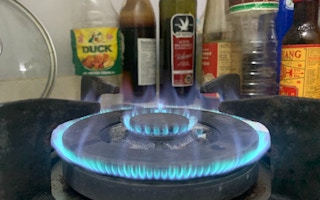Singapore has made an amendment to its green buildings certification scheme that incentivises the phaseout of natural gas for cooking in hotels, retail and residential buildings.
The tweak to Singapore’s Green Mark scheme, which evaluates buildings based on criteria such as energy and water efficiency and indoor air quality, will make it easier for new buildings to get certified as green if they are built with electric instead of gas connections for cooking.
In a letter to building industry professionals on Wednesday seen by Eco-Business, the Building and Construction Authority (BCA), Singapore’s industry regulator, said that considering the “urgent need” for decarbonisation, any building project that “fully embraces” induction cooktops will receive 0.5 points in Green Mark assessments. A building must be awarded 40 points or more to achieve the highest green rating for buildings in Singapore.
“All power grids are expected to transition to low carbon or near-zero emissions sooner rather than later. We’re witnessing this shift in various sectors, including transportation and energy production, and now it’s time for the food and beverage industry to follow suit,” a BCA spokesperson said in the letter.
BCA referred to data from the United States’ Environmental Protection Agency, which finds that induction cookers are more efficient than gas cookers.
The amendment to Green Mark follows a period of lobbying from green buildings advocates, who are pushing for fossil fuel-free buildings in the highly urbanised city-state and globally, as real estate companies work towards their own decarbonisation targets.
Benjamin Towell, executive director, global wholesale banking sustainability office for OCBC Bank, former BCA deputy director and lead author of Green Mark 2021, called the update a “step in the right direction” for the electrification of buildings in Singapore.
Although the change to the green building certification scheme is minor, it will likely evolve to include incentives for electric water heaters instead of the gas-powered variety, he said.
Towell added that he hoped to see gas consumption included in the BCA’s annual building benchmarking reporting, which would promote a better understanding of building energy use and encourage existing buildings to be retroffied with electric connections.
Joelle Chen, head of sustainability for property firm Lendlease in Asia, said she welcomed the growing recognition of electrification and the need to eliminate fossil fuels in Singapore’s updated green buildings certification scheme.
Her company is a founding supporter of the Global Cooksafe Coalition, a cross-industry group pushing to replace fossil-based cooking fuels with safe, energy-efficient electric appliances.
She said Lendlease aims to phase out gas from kitchens in new developments by 2030 and retrofit all of its existing properties with electric cookers by 2040, as it works towards an absolute zero carbon target.
The amendment to Green Mark comes one month after an energy consumer lobby in Australia sought to stop gas connections from being installed in new homes across the country. In June, the Victoria state government also announced a ban on gas connections in new homes and government buildings, citing climate concerns.
In September, Singapore energy company City Energy came under fire for encouraging consumers to “go green” by installing gas-fired water heaters. Critics pointed out that marketing gas as “green” is misleading because of the fossil fuel’s climate impact.
The International Energy Agency has said that the sale of new fossil fuel boilers must be banned by 2025 as one of the measures needed to decarbonise the built environment.

















